Concealed carry: Why some propane retailers created policies
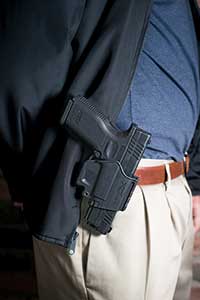
Crime concerns, changing legislation prompt some propane retailers to create concealed-carry policies for their workplaces. Photo by Martin Eisert
Concealed-carry policies seldom come up as an agenda item among propane retailers, but ever-changing state laws on concealed-carry licenses and crime reports have led some propane retailers to consider creating a policy on the issue.
LP Gas surveyed propane retailers about concealed-carry policies, including for employees and customers, and found that 25 percent have a policy at their workplace. Some policies were created in recent years, while others have been in place for decades.
Phelan Gas Co., based in Phelan, Calif., recently created a concealed-carry policy. Dustin Shafer, company president, says the county sheriff encouraged all companies in more rural areas to consider creating concealed-carry policies. Phelan Gas is based in Southern California’s San Bernardino County, the largest county in the United States. It encompasses more than 20,000 square miles.
While there are some urban areas of the county, Shafer says much of it is rural.
“We don’t have nearly as much police coverage as we used to,” Shafer says. “Some response times are crazy slow since there might be only one or two patrol cars covering a 60-mile area.”
Phelan Gas responded quickly to the sheriff’s encouragement. Shafer researched company concealed-carry policies and blogs on the issue before coming to his decision for Phelan Gas. He decided against letting employees carry concealed weapons on company property. Phelan Gas requires employees to keep any concealed weapons at home or in personal vehicles while at work.
Although Shafer agrees people have the right to carry concealed weapons if they have a license and no criminal record, he feels it is not appropriate at work because there is more risk involved.
“Just because one guy is comfortable with people carrying doesn’t mean another is,” Shafer says. “You want to create a comfortable work environment. At the same time, I see people getting concealed weapons exponentially, so I think it’s wise to be protected outside the workplace.”
Considering a policy
According to LP Gas’ survey, a majority of propane retailers currently lack a formal concealed-carry policy. Still, a number of retailers say they would consider creating one to exhibit the company’s stance on weapons.
More than half of the retailers who told us they have no concealed-carry policy say they would consider creating one. Law enforcement professionals say a thought-out, researched and enforced concealed-carry policy is always safer than having no policy.
Mark Witherell, covert operations commander for the San Antonio Police Department, says a policy reinforces an employer’s opinion on a controversial issue such as concealed carry in the workplace. While employees might listen to an employer’s opinion, the opinion cannot stand against lawsuits.
“Policies aren’t as strong as state or federal law, but they’re better than opinions,” Witherell says. “If you have a policy that an employee didn’t follow, you are always in a better position to tell them they violated the policy as opposed to they violated your opinion.”
According to LP Gas’ survey, one of the top reasons propane retailers created a concealed-carry policy is because the issue came up at their workplace. Wade Edington, general manager of North Idaho Propane, says this is the reason he developed a concealed-carry policy for his employees three years ago.
“We learned one of our employees was carrying, so I decided we better look into the issue,” he says.
After debating the issue, North Idaho Propane decided to allow employees to carry concealed weapons at work. Before coming to that decision, Edington says the company communicated with local state police and the U.S. Department of Transportation (DOT) to check the laws and whether carrying a concealed weapon in a bobtail is OK.
“The DOT said as long as you have a valid permit in the state you are carrying in, DOT has no problem with concealed carry in a bobtail in Idaho,” Edington says. “So we allowed it. We don’t highly encourage our employees to carry concealed, but we also don’t deny anybody with a concealed-carry license.”
Companies cited crime and safety concerns as other popular reasons for creating concealed-carry policies.
Louis Centofanti of Commercial Miscellaneous Sales LLC, a propane and welding company in Pennsylvania, says he opted to let his employees carry concealed weapons for his drivers’ safety.
“Unfortunately we service some areas that aren’t so nice,” he says. “You have angry customers or customers who aren’t willing to pay. A few years ago, we had a driver who got pushed by a customer. I let all my employees know if it makes them more at ease, carry if they think that’s safer.”
Implement a policy
When a company decides to move forward and create a concealed-carry policy, Witherell recommends employers talk to local police departments or attorneys for background on state and federal laws. He adds police can’t enforce company policies but can document situations in which a person becomes combative, violent or refuses to follow the policy.
“Police can create a report on a violation, stating that the company policy was violated,” Witherell says. “That report can be used as a record of what happened; however, we can take action if any violence arises on the property, like if someone starts waving a weapon around or threatens to use it.”
Edington adds that a policy can deter any future disagreements on the issue.
“Without a policy, any disagreement on the issue is only personal opinion,” he says. “And my opinion might not mesh with other people’s opinions.”
When Shafer of Phelan Gas drafted his company’s policy this year, he said he hosted a meeting to make sure everyone knew the plan. He says he wanted to “make sure everything was clear” and understood by his employees.
Michael Wong, an attorney with SmithAmundsen in St. Charles, Ill., hosted a webinar in 2014 titled “Locked, Loaded and Licensed: Concealed Carry in the Workplace.” The webinar focused on how employers could implement a concealed-carry policy and address violence in the workplace.
In the webinar, Wong says if employers cannot enforce or maintain their concealed-carry policy, it is almost better not to have one. Not enforcing the policy could put the employer at risk if a legal issue comes up.
Wong also offers concealed-carry policy tips for employers:
1. Consult legal counsel on implementing a policy that addresses the business’ concerns and applicable laws.
2. Set procedures for management and employees to report or respond to threats or violent acts.
3. Educate management and employees on the company’s position and policy.
4. Review insurance policies and talk with insurance agents to confirm your policies and coverage are adequate.
5. Keep up to date with legal challenges and lawsuits to minimize exposure.
About the survey
In May, LP Gas emailed an anonymous, online survey to readers (made up of independent retailers, major marketers and farm cooperatives) regarding concealed-carry policies. We asked whether companies have a policy, how they developed that policy and more. The data in this story reflects the responses we received from 288 propane retailers.
Top reasons companies say they created a concealed-carry policy
1. Safety and security
2. Insurance and liability
3. Issue came up at work
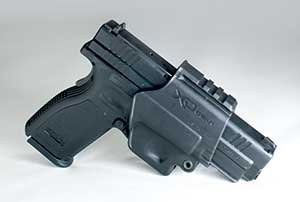
Concealed carry is a state issue – not a federal one – so retailers exploring policies for their companies should reach out at the state level to determine legality. Photo by Martin Eisert
Is it legal?
Some propane retailers report they would like to create a policy that allows employees to carry a concealed weapon in a bobtail, but many say they are uncertain whether this is legal.
Duane DeBruyne, a representative with the Federal Motor Carrier Safety Administration, says concealed-carry policies fall under state legislation, so there are no federal regulations. He adds the ruling on whether this is legal varies in each state.
DeBruyne recommends individuals interested in determining whether it is legal to carry a concealed weapon on a bobtail reach out to their local department of transportation before creating a policy.
Crime rates in the United States
While crime is rare in the propane industry, it can affect retailers. Several propane retailers tell us their concerns about crime were the reason they created or considered a concealed-carry policy.
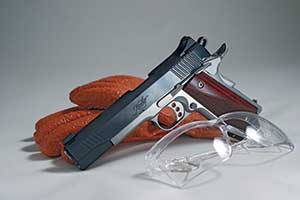
Should companies consider guns as part of the standard safety equipment used by drivers? Photo by Martin Eisert
According to the FBI, there was a decrease of 4.6 percent in the number of violent crimes – including murder, rape, robbery and aggravated assault – for the first six months of 2014 compared to figures the previous year. The number of property crimes for the first six months of 2014 also decreased 7.5 percent when compared with the same data from the previous year.
Despite the decrease in crime, creating a policy can’t hurt a company. According to Guy Smith, author of “Gun Facts,” concealed-carry laws do not increase crime rates. Smith adds that gun homicides tend to be 10 percent more common in states with restrictive concealed-carry laws than states with less-restrictive concealed-carry laws. Some of his other findings include:
■ Robbery is 105 percent more likely to happen in restrictive concealed-carry states than in states with less-restrictive rules.
■ Murder is 86 percent more likely to happen in restrictive concealed-carry states than in states with less-restrictive rules.
■ Assaults are 82 percent more likely to happen in restrictive concealed-carry states than in states with less-restrictive rules.
■ Violent crimes are 81 percent more likely to happen in restrictive concealed-carry states than in states with less-restrictive rules.
■ Auto thefts are 60 percent more likely to happen in restrictive concealed-carry states than in states with less-restrictive rules.
The opinions
Propane retailers who responded to LP Gas’ anonymous concealed-carry policy survey shared their opinions on whether they feel a policy could help companies. Here are some of the responses:
Policy in place
“I want my employees to carry on the job. A driver can be coming back to refill their bobtail and have [cash] on them. For their safety, if they don’t have a concealed-carry permit, I suggest they get one.”– a Pennsylvania retailer
“We have a policy. A customer walked in with a gun, and we now clearly state that guns are not allowed on the premises. And yes, a few hunters got upset. I told them this was simple safety.”– a Texas retailer
“We have a policy. A union-organizing attempt several years ago resulted in several employees on both sides of the issue [bringing] guns to work.”– a Connecticut retailer
No policy
“My husband and I both carry at our store, open or concealed. We have no specific policy about it. It’s personal choice. The police cannot always be where they need to be at the moment you need them. I work closely with our local police and sheriff’s department. They all think protecting yourself is a great idea and wished more people did it. You need to know the laws in your state, though, and make sure you obey them. The weapon you carry is a last resort when all else fails.”– a Colorado retailer
“Currently we are silent on the issue, although I have voiced my support of concealed carry while at work to our employees. As long as someone is trained and knowledgeable in the use of a firearm, I am fine with them doing so. I personally do not carry a firearm, but I am glad there are citizens who are armed and trained to deal with emergency situations.” – an Indiana retailer
“Once you begin to implement policies regarding constitutional amendments, you begin to delve into the realm of soon infringing on our freedom of speech and religion. If I want to carry a Bible on my person or in my truck, I don’t want someone telling me I can’t.”– a Massachusetts retailer








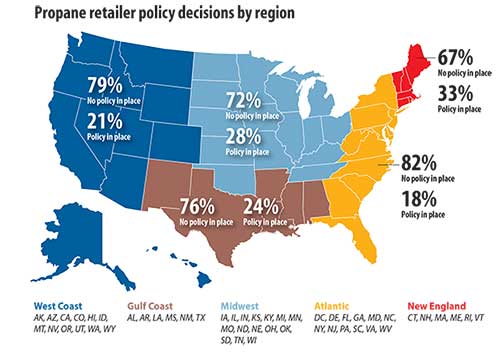
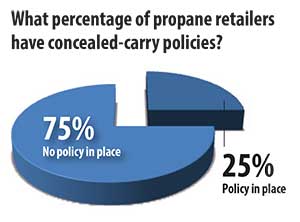
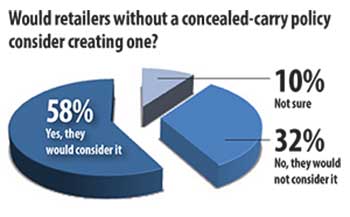
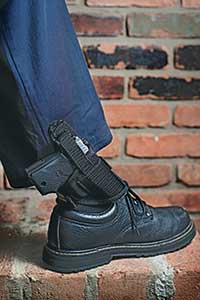

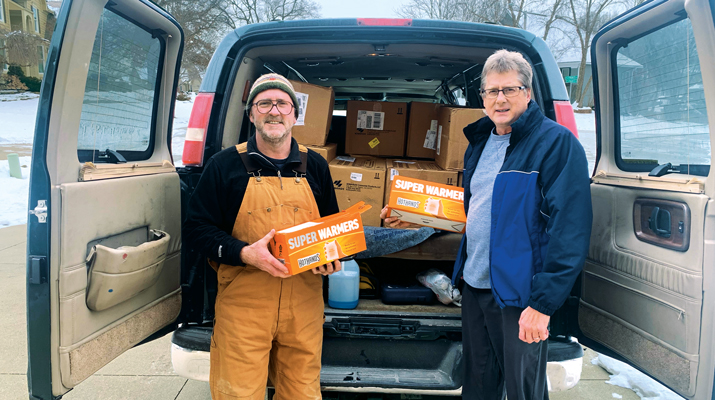

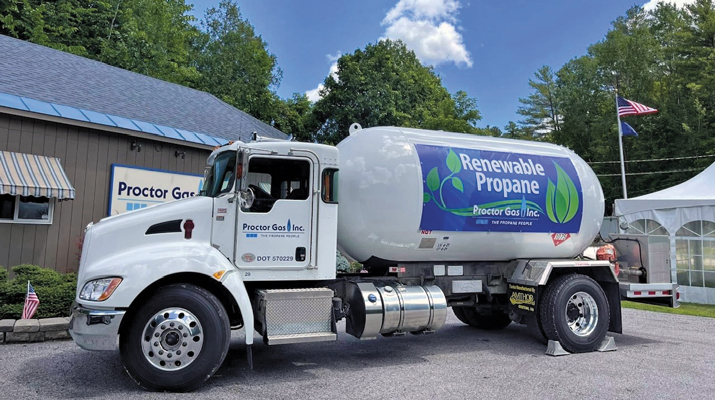





This is a great article and touchy subject matter. With this being said, many of our employees are former military and placed through drug test and backgrounds checked. I for one feel better knowing some of our employees carry, including myself.
I know that those that carry would defend themselves and others that were put in harms way by actions of those that should not have guns in the first place. “No gun” signs have done nothing to prevent mass shootings, car-jacking, robbery etc.
In Georgia, we issue weapons license that no longer require concealment after a GBI check. While our employees carry, they do conceal. We encourage employees to obey all laws and feel free to carry as long as permits have been obtained.
One good “carrying citizen” could prevent tragedy.